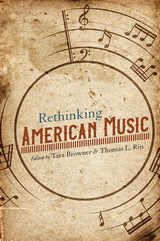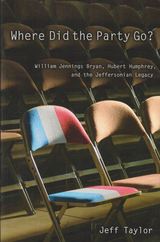2 books by Taylor, Jeff

Rethinking American Music
Edited by Tara Browner and Thomas L. Riis
University of Illinois Press, 2019
In Rethinking American Music, Tara Browner and Thomas L. Riis curate essays that offer an eclectic survey of current music scholarship. Ranging from Tin Pan Alley to Thelonious Monk to hip hop, the contributors go beyond repertory and biography to explore four critical yet overlooked areas: the impact of performance; patronage's role in creating music and finding a place to play it; personal identity; and the ways cultural and ethnographic circumstances determine the music that emerges from the creative process. Many of the articles also look at how a piece of music becomes initially popular and then exerts a lasting influence in the larger global culture. The result is an insightful state-of-the-field examination that doubles as an engaging short course on our complex, multifaceted musical heritage. Contributors: Karen Ahlquist, Amy C. Beal, Mark Clagu,. Esther R. Crookshank, Todd Decker, Jennifer DeLapp-Birkett, Joshua S. Duchan, Mark Katz, Jeffrey Magee, Sterling E. Murray, Guthrie P. Ramsey Jr., David Warren Steel, Jeffrey Taylor, and Mark Tucker
[more]

Where Did the Party Go?
William Jennings Bryan, Hubert Humphrey, and the Jeffersonian Legacy
Jeff Taylor
University of Missouri Press, 2006
It doesn’t take a pundit to recognize that the Democratic Party has changed. With frustrating losses in the national elections of 2000 and 2004 and the erosion of its traditional base, the party of Jefferson and Jackson has become something neither would recognize.
In this intriguing book, Jeff Taylor looks beyond the shortcomings of individual candidates to focus on the party’s real problem: its philosophical underpinnings have changed in ways that turn off many Americans. Rank-and-file party members may still hold to traditional views, but Taylor argues that those who finance, manage, and represent the party at the national level have become nothing less than Hamiltonian elitists—a stance that flies in the face of the party’s bedrock Jeffersonian principles.
Where Did the Party Go? is a prodigious work of scholarship that converts extensive research into an accessible book. Taylor offers up a unique twelve-point model of Jefferson’s thought—as relevant to our time as to his—and uses it to appraise competing views of liberalism in the party during two key eras. Bypassing the well-worn assessments of high-profile Democratic presidents, he shows instead how liberalism from 1885 to 1925 was distinctly Jeffersonian as exemplified by the populism of William Jennings Bryan, while from 1938 to 1978 it became largely elitist under national leaders such as Hubert Humphrey who embraced a centralized state and economy, as well as imperial intervention abroad.
In the first book to look closely at the ideologies of these two midwestern liberals, Taylor chronicles Bryan’s battles with the conservative wing of the party—putting today’s conflicts in sharp historical perspective—and then tells how Humphrey followed those who rejected Jeffersonian principles. By demonstrating how Jefferson’s legacy has gradually weakened, Taylor clearly shows why the party has lost its place in Middle America and how its transformation has led to widespread confusion. His provocative look at the post-Humphrey era considers why so many of today’s voters on both the Left and the Right agree on issues such as economic policy, foreign relations, and political reform—united against elitists of the Center while rarely recognizing their common kinship in Jeffersonian ideals.
If party leaders have wondered where their traditional supporters have gone, they might well consider that those very voters have asked what became of the party they once knew. Taylor’s book forces many to question where the party of Jefferson has gone . . . and whether it can ever come back.
[more]
READERS
Browse our collection.
PUBLISHERS
See BiblioVault's publisher services.
STUDENT SERVICES
Files for college accessibility offices.
UChicago Accessibility Resources
home | accessibility | search | about | contact us
BiblioVault ® 2001 - 2024
The University of Chicago Press









